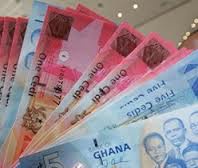
Findings by Send Ghana, a non-governmental organisation advocating judicious use of resources has revealed that only 40 per cent of the District Assembly Common Fund (DACF) gets to the Metropolitan, Municipal and District Assemblies (MMDAs).
The research, which was conducted between the periods of 2007 and 2010 in 50 MMDAs in the Northern, Upper East, Upper West and the Greater Accra regions was made known at a District Assembly meeting held in Bolgatanga on Monday.
The meeting was to discuss the research findings on the District Assembly Common Fund (DACF) and to chart a way forward to ensure effective management and utilization of the Fund.
Presenting the findings Mr Yirbuer Eugene, a Programme Officer of SEND Ghana, said the findings established that 60 per of the Funds were deducted by the Common Fund Secretariat in the forms of statutory and non-statutory deductions before it got to the Assemblies.
He said in some instances the deductions made by the Common Fund Secretariat went beyond the 60 per cent and noted that this drastically affected the financial vitality of the MMDAs to address the development challenges they face.
“These deductions are sometimes done without the prior notice of the MMDAs which is a gross violation of the DACF guidelines. The DACF guidelines states that every deduction made at source should be done through resolution passed by the MMDAs,” he said.
Per the DACF guidelines, before any deduction can be made to purchase items for the MMDAs, the minutes of the Assembly Session of the MMDAs would have been signed by the appropriate authorities particularly the Presiding Member and then submitted to the office of the Administrator of the DACF through the Ministry of Local Government and Rural Development for approval.
Other signatories should include the DCE and District Coordinating Director.
However, this is often ignored by the DACF Secretariat.
According to the report, most of the items purchased by the Common Fund Secretariat for the MMDAs were not demand driven, but were imposed on them thereby thwarting planned development at the various MMDAs.
Quoting from the 2008 Auditor General Report, the research revealed that total average deductions made on the Common Funds of all assemblies in the Greater Accra Region was 58.88 per cent.
Deductions from the MMDAs in the Northern Region averaged 66.99 per cent, whilst the Upper East and Upper West Regions recorded 54.71 and 60.44 per cent respectively.
It said in 2009 the deductions of the Assemblies Common Funds were quite alarming reaching as high as 80 per cent and cited the deductions made on funds for the Nanumba North as 84.51 per cent. Others included Tamale Metropolitan 74.70 per cent, Accra Metropolitan 74.45 per cent, Bole 71.06 per cent and Bolgatanga Municipal 68.96 per cent.
Deductions from Lawra District stood at 68.35 per cent, Nadowli District, 67.35 per cent and Sissala West 66.05 per cent as well as Kassena-Nankana West and East 68.35 per cent, Bawku West 61.38 per cent and Dangbe West Municipal 60.15 per cent.
The research showed that deductions of the DACF in 2011 reached more than 80 per cent for some MMDAs whilst others recorded as low as 30 per cent as their DACF.
The research also cited some of the MMDAs for causing financial irregularities, misappropriation and misapplication of funds, procurement irregularities, contract irregularities and tax irregularities among others.
It recommend urgent need to minimize the level of deductions made from the DACF and also stated that transactions conducted by the DACF Administrator and MLGRD should be demand driven. It further recommended that all MMDAs establish both internal and Audit Implementation Committees to follow the implementation of the Auditor General Report.
The Presiding Member of the Bolgatanga Municipal, Mr Donatus Nyaba commended SEND Ghana for the research and said the findings would help them improve upon the decentralization concept.